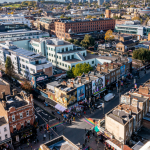The London Property Alliance, which represents the UK capital’s leading real estate developers and investors, has published the latest edition of its Global Cities Survey showing that an Olympic ‘bounce’ will see Paris push ahead of London across several key economic indicators.
The survey points to a more positive outlook for economic growth in Paris, where GVA is projected to increase to 2.89% in 2025, ahead of London which is forecast to grow 2.27%. The City of Light’s economic lead comes on top of its 1.3% growth in 2024 with London lagging behind at sub 1% (0.92).
However, the robust performance of central London’s office markets, which is consistent with previous quarters, suggests continued confidence in London’s fundamentals. The report finds that the West End office market witnessed the strongest levels of prime real estate rental growth (12%) of all office submarkets compared in the Global Cities Survey, while City of London rents rose close to 9% (8.8). London’s market is expected to witness a 5.3 million sq ft shortfall in new, modern office space, with vacancy rates in the West End at its lowest level since 2020, increasing upward price momentum.
Paris, where office vacancy has plummeted to c. 2%, saw rents rise just under 10% (9.9) versus just 1% a year ago, but Berlin and Manhattan are seeing only nominal growth at 2.1% and 1.1% respectively. Hong Kong, meanwhile, saw office rents decline by a nearly 5% (4.7) over the same period amid weakening demand.
London is also outperforming its rivals on foreign direct investment (FDI) with 75 overseas investments recorded in the latest quarter, including major infrastructure and real estate transactions. This is significantly ahead of New York (45) and also Paris (28), where the Olympics is likely to have caused a temporary deferment in some moves. Economic uncertainty in Germany saw Berlin’s FDI projects plummet to 17 from 75 projects two years ago.
Paris is seeing the highest level of public transport ridership suggesting a higher proportion of workers are choosing to work in offices, boosting the city’s culture, retail, leisure and hospitality sectors. A recent survey by Centre for Cities, a think tank, found that Parisians are going into the office 3.5 days of the week compared to 2.7 in London. Passenger numbers are up 15% on 2019 levels following the completion of the Grand Paris Express project in June, while passenger numbers in London have plateaued at 14% below the pre-COVID level, despite the delivery of the Elizabeth line. Meanwhile the New York City Subway continues to lag behind both major cities, with ridership still only 71% of 2019 numbers. This is despite a stronger return to the office compared to many world cities.
The number of people currently in employment in Paris is also 7.3% higher than its pre-pandemic level, while there has been almost no growth in the employment market in London and New York (up just 0.9% and 1.9% respectively) and a significant decline of 4.8% in Hong Kong
Charles Begley, Chief Executive, London Property Alliance added: “The key indicators suggest that Paris is benefitting from a bounce associated with the Olympics. The afterglow of preparing and putting on a successful games places Paris on a strong footing to compete with London for talent and investment.
“Business confidence is good in both cities, as evidenced by rising office rents and low vacancy rates, and London remains ahead on foreign direct investment. Despite this, the increasing divergence in economic and employment growth suggests London’s success cannot be taken for granted. We must continue to invest in world-class infrastructure and workspace or risk being left behind by competing global cities.”
Read the report here

